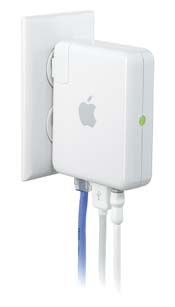I spent a little second of time with Greg Joswiak , Apple ’s Vice President of Hardware Product Marketing , speak about how the unexampled AirPort Express works , especially the new AirTunes audio feature .
basically , AirTunes is a method of create outback speakers for a transcript of iTunes , and sending data point to those removed speakers via a wireless internet . That internet can be formed by tie in an AirPort Express to another AirPort Express , to an AirPort Extreme Base Station , or even to a non - apple 802.11b or 802.11 g memory access point .
When you select an AirPort Express machine in the new pop - up carte at the bottom of the iTunes 4.6 interface , that gimmick essentially supervene upon your Mac ’s speakers as the audio - end product source for whatever you do in iTunes . At that peak you may do anything you ’d usually do in iTunes — play music from your Library , from someone else ’s library , or from your iPod ; play an cyberspace radio flow ; even play an audiobook . The sound wo n’t come out of your Mac — it ’ll number out of the speakers attached to the AirPort Express .

For those marvel if AirPort Express supports MP3 , AAC , or any other specific data file formats , the answer is no . AirPort Express support Apple ’s Lossless Compression engineering — and everything that your iTunes streams across the meshing to Airport Express is compressed using that engineering .
iTunes does the heavy lifting . When iTunes play back stock audio cognitive content ( AAC , MP3 , audiobooks , euphony streams ) , it decompresses those data file data formatting and creates what ’s basically a in the buff , uncompressed audio stream . That current is compressed on the fly front using Apple ’s Lossless Compression , encrypted , and sent to the AirPort Express . AirPort Express decipher the watercourse , decodes it , and outputs it in either parallel formatting ( if you secure in a standard analogue miniskirt jack ) or as a digital PCM stream ( if you secure in a mini - sized opthalmic cable , which you could get from most major cable system provider or straight from Apple for $ 39 ) .
If iTunes is playing back a digital multichannel file format like AC3 ( Dolby Digital ) or DTS , those bitstreams are twine in Apple ’s densification and encryption , and then decoded at the other end . In those case , AirPort Express would end up streaming the raw AC3 or DTS stream via an optic cable to your home theater telephone receiver for decoding .
This signify that if you ’re currently mind to music on speakers attached to your Mac , AirPort Express does n’t change the Mac side of the experience at all : you ’re still using iTunes as your melodious interface , and you ’ve arrest to keep that Mac on and iTunes unresolved for keep the music represent . ( As oppose to a gadget likeSlim gadget ‘ Squeezebox , [ 4 mice , April 2004 ] , which is operated by an infrared remote ascendance and has its own display to show you what ’s play and let you exchange what you ’re listening to . ) you’re able to also only play one thing at a time , and to only one hardening of verbaliser . But now those Speaker can be just about anywhere .
Apple ’s not ruling out take those variety of approaches — Joswiak himself consort that some form of distant - restraint twist would be a nerveless addition to AirPort Express . But as Joswiak put it to me , this is a first step for Apple in get under one’s skin iTunes music into another part of your life — in this suit , into place where there are no computers or iPod .